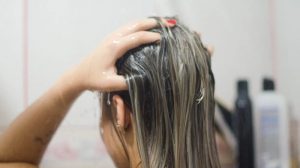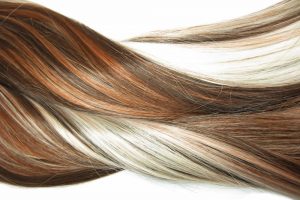![How Much Does Hair Weigh Already Solved [Newest]](https://www.musehaircare.com/wp-content/uploads/2022/10/How-Much-Does-Hair-Weigh-Already-Solved-Newest-2.jpg)
How Much Does Hair Weigh? Already Solved [Newest]
To start with, how much does hair weigh?
An average hair (about six inches in length) weighs about 0.2-0.4 milligrams or 0.00015 ounces. Between 80,000 and 120,000 hairs cover the head of a healthy person. Therefore, the majority of full heads of hair only weigh a few ounces.
Keep reading.
Table of Contents
How Much Does Hair Weigh?
Unless it is very long and thick, the average person’s hair weighs less than half a pound. Even the thickest hair won’t weigh more than a pound or two; the exact amount varies depending on a number of factors.
The short answer is that hair weight varies, but not significantly. Hair density and coarseness are innate genetic characteristics that cannot be changed for any one person. Due to the slight variations in each person’s hair, the weight varies.
However, a person’s hair weight can vary slightly every day, depending on their level of hydration. Hair weighs a bit more when it has more water in it. These variations are minute and hardly perceptible on a normal scale. The length and thickness of the hair make the biggest difference in weight.
How Does Your Hair Weight Affect You?
You might wonder how your hair affects your daily life in addition to how much it might weigh. Let’s examine the possible effects your hair may have on your life.
Does Having Hair Make Me Weigh More?
If your hair is extremely thick and reaches the floor, it could increase your weight by a few pounds. However, a typical person with shoulder-length hair could shave their entire body and only notice a few ounces of weight loss. With shorter hair, the difference is hardly noticeable enough to weigh.
It doesn’t really make much of a difference, but there are times when it feels like your hair is very heavy. Your scalp may feel the weight of your hair a little more keenly if it is particularly sensitive. You might feel more at ease with a shorter haircut if your hair is overly thick.
Wet Hair Weighs How Much?
You can weigh yourself before and after a bath if you’re curious about how much your hair weighs when it’s wet versus when it’s dry.
The difference, however, is most likely going to be negligible and will most likely be less than daily fluctuations brought on by your level of hydration, how much food you eat, and scale errors.
Water sucked up between your hairs will be the main source of weight. You’ll gain more weight if your hair is longer and wetter. It’s doubtful that having long hair would add more than a few ounces to your weight.
Does Hair That Is Constantly Dry Weigh Less?
As previously mentioned, when hair absorbs water, it expands beyond its normal size. Your hair gets a little bit lighter as it dries. Even less moisture is present in chronically dry hair than in other hair types.
Your hair would be lighter than hair that is properly hydrated due to the consistent lack of moisture.
Low moisture does, however, result in dry, brittle hair, so this isn’t something you should be aiming for.
How Much Synthetic Hair Weighs
Many people cannot even tell the difference between modern synthetic hair and natural hair due to its exceptional quality.
Acrylic or nylon are examples of synthetic materials used to make it. These fibers weigh less than human hair naturally.
The keratin that makes up your actual strands of hair weighs more than the fibers used to create synthetic hair. Despite this, when synthetic hair is braided with your natural hair, they still add more weight to your current hair.
Depending on its length, thickness, and density, a synthetic wig will weigh differently than expected.
How Much Weight Are Hair Bundles?
Virgin hair is collected from Asian women and is typically made into bundles. To keep the strands together, wefts are next attached to the natural hair. These hair bundles are subsequently used for weaves.
The typical hair bundle weighs about 4 ounces. Generally speaking, you won’t be weaving with just one bundle. The number you require will depend on the size of your head, the length of your hair, and the thickness you want.
For a full weave, most women use three or four of them. Bundles typically consist of natural hair, so their weight is comparable to the rest of your hair.
When purchasing a weave, the weft adds weight that you might not have thought about. The bundles won’t be excessively weighty, but they could increase the average weight of your hair by a few extra ounces.
Wigs Weigh How Much?
Since there are two different types of wigs, there is no standard weight for them. Among them are both natural and synthetic wigs. Since each one has advantages and disadvantages, weight is only one factor to take into account.
Synthetic Wigs
Because they are simple to maintain, synthetic wigs are popular. They are already fully styled, so there is no need for you to fuss. Simply put them on, make a few minor adjustments, and you’re good to go.
When compared to natural hair, synthetic hair is also more lightweight. Depending on the length of the wig, you may only be adding a pound or two on your head. Even when wearing it all day, you probably won’t even feel the weight.
Of course, these wigs have drawbacks. You can’t flat iron or curl your synthetic unit because the materials used to make these wigs aren’t heat-resistant.
You will need a variety of wigs if you want to occasionally change up your appearance because they cannot be styled.
Human Hair Wigs
Human hair wigs are heavier than synthetic wigs at about 1.5 to 2 pounds. The method of construction and hair length affect the wig’s overall weight.
For a more natural appearance and light weight, some wigs are made with ventilation. Wigs with no ventilation have more hairs per knot.
These can be made more quickly, but they weigh a lot more. They are less comfortable to wear because they also don’t breathe as well.
The natural hair wigs are heavier, but there are some advantages to be aware of. If you want to change up your look or match the color of your skin, they can be professionally colored however you like.
You can also alter the style whenever you like, even with your regular styling supplies and heating tools.
Why Is Hair So Resilient?
Even though a hair strand is very small, it can withstand about 3.5 ounces of force. The 100,000 or so hairs on your head could conceivably withstand a force of 10 to 15 tons.
Long chains of the protein keratin are responsible for the durability of your hair. The same protein that gives nails and claws their strength is keratin.
Can You Remove The Weight From Hair?
By taking in water, hair can swell by about 15% (Reliable Source). Theoretically, hair that has been dried out may weigh less. However, unless you’re using a scale that can measure to many decimal places, the difference is unlikely to be noticeable, and you’ll probably harm your hair.
Getting a haircut would be the simplest way to reduce the weight or volume of your hair.
How To Weigh Yourself Accurately
In particular, if your hair is very long and wet, weighing yourself after you get out of the shower may result in a slight weight increase.
Avoid weighing yourself right after a bath if you want an incredibly accurate reading.
To weigh yourself accurately, you can try to follow these tips:
- You shouldn’t weigh yourself more frequently than once per week. You cannot accurately determine how your weight is changing because of the high daily fluctuations.
- Before you eat or drink, weigh yourself first thing in the morning.
- Each time you weigh yourself, dress the same way (or not at all).
- Aim to maintain consistency by deciding whether you will use the restroom before or after you weigh yourself.
Is Aerodynamics Affected?
Your weight is unaffected by your hair, but it can have an impact on your aerodynamics. To make themselves look a little bit sleeker in the water, professional swimmers frequently shave their entire bodies. Swim caps lessen the resistance of water in hair. However, their weight remains unchanged.
What Composition Is My Hair?
Keratin, a protein that develops from a follicle beneath your scalp, makes up the majority of hair. Your blood vessels aid in hair growth as a result of changing hormone levels. Natural hair loss and decomposition occur after a certain amount of time, making room for the growth of new hairs in their place.
Since hair is not a living thing, getting a haircut doesn’t hurt. Even though keratin is a thick protein when compared to other proteins, it is still incredibly small and thin. Even though hair hardly weighs anything, it naturally shields the skin from the sun and weather.
Things To Consider
Here are some things to consider about hair and how its weight affects you:
- Your hair becomes heavier as it grows longer.
- Only a few ounces will be impacted by your hair in terms of overall weight.
- The protein-based dead cells that make up hair are not a living structure.
- Your hair will weigh more as you become more hydrated. Hair holds water.
- Your hair may become damaged from over-drying.
- Tension headaches can be brought on by pulling your hair back into tight buns or ponytails.
- It is heavier for coarser hair than for fine hair.
![How Much Does Hair Weigh Already Solved [Newest]](https://www.musehaircare.com/wp-content/uploads/2022/10/How-Much-Does-Hair-Weigh-Already-Solved-Newest.jpg)
On A Human Head, How Many Hairs Are There?
The average person has between 80,000 and 120,000 hairs on their head. It’s interesting to note that a person’s hair color can affect how many hairs they have on their head, with blondes typically having the most and redheads typically having the fewest.
Average Number Of Hairs By Hair Color
Blonde: 150,000
Brown: 110,000
Black: 100,000
Red: 90,000
How Does Hair Grow?
The fact that not all of your hairs are the same length is an important consideration when estimating how much your hair weighs. For starters, not all of your hair is cut to the same length, and many hairstyles include layers or a fringe.
However, you should also think about the cycle of hair growth.
Your hair has three main growth phases:
Anagen (Growth Phase): The majority of your hair—between 85% and 90% of it—is at this stage. It will take your hair two to six years to go through this phase. Because it takes a long time, some people are able to grow their hair longer than others. During this stage, the average monthly growth for your hair is 0.5 inches.
Catagen (Transitional Phase): Your hair will start to grow more slowly at this stage because it is a transitional one. This stage is experienced by about 3% of your hair.
Telogen (Resting Phase): This phase is present in 8% of your hair. It lasts for about three months and is the point at which hair growth ceases. The inactive hair is shed following the completion of the three phases, and the cycle is then restarted with a new hair shaft emerging from the follicle. This process results in the scalp losing 100 hairs on average per day, though this number can increase depending on how often you wash your hair and how you take care of your hair.
You may want to know How long does it take to grow hair 12 inches?
How To Reduce The Weight Of Your Hair?
If you want to reduce the weight or volume of your hair, for example if it is very thick or prone to frizzing out, the easiest way is to get a haircut that’s appropriate for your hair type.
It might be necessary to have some lengthy layers added or to have your hair thinned with thinning shears.
Overly voluminous hair can also be controlled by using stronger shampoos and conditioners and the proper styling products, like serums.
If you have locs or braids and want to reduce their weight, getting them trimmed shorter or having thinner locs or braids put in can help reduce their weight.
Avoid using heavy products that can build up as well because over time, this will make your locs feel heavier.
Frequently Asked Questions
How Much Does The Average Person’s Hair Weigh?
Individual differences exist in the density of human hair. The weight of a person’s hair is influenced by genetics, hair density, and hair texture. Between 0.000076 and 0.00013 ounces, or 0.02 to 0.04 milligrams, is the weight of a six-inch long hair strand. An average person’s scalp grows between 80,000 and 120,000 hairs per month. The weight of a typical head of hair is 0.00064 ounces per square inch.
A Bundle Of Hair Weighs How Many Grams?
The thickness of the individual hair strands will determine how many grams a bundle of hair weighs. A small bundle of hair typically weighs 50 to 100 grams. In between 100 and 150 grams, medium hair weighs. A bundle of thick hair weighs between 150 and 200 grams.
Is Wet Hair Heavier Than Dry Hair?
Hair strands swell by about 15% as a result of water absorption by hair. Dry hair always weighs less than wet hair. Long, wet hair weighs more because the extra weight is caused by the water being absorbed. Wet, natural hair that is longer than its counterparts weighs more. Even thick, long hair typically weighs no more than one pound.
Are Human Hair Wigs More Lightweight Than Synthetic Ones?
In comparison to synthetic wigs, human hair wigs are heavier. 120 to 300 grams, or three to six ounces, is the range of possible weights. Weight variations are affected by production methods and design choices. Wigs made of human hair are more expensive but look more realistic and are more adaptable.
Synthetic Hair Weighs How Much?
Wigs made of synthetic hair range in weight from 45 to 150 grams, or 1.587 to 5.291 ounces. Human hair is heavier than synthetic hair. If you intend to wear a wig for an extended period of time, opt for synthetic wigs.
When My Hair Is Wet, Does It Become Heavier?
In theory, wet hair weighs a little bit more. But without a very precise scale, it is impossible to detect the difference because it is so slight. When you take a shower, the water between each hair makes your hair feel heavier.
How Do I Determine My Weight Without Hair?
Except for shaving off all of your body hair and weighing yourself, there is no precise way to determine how much you would weigh without hair. However, there won’t be a noticeable difference whether your hair is dry or wet. If you consistently weigh yourself, be sure to do so with the same amount of food and water and at the same time of day.
Does Heavy Hair Cause Headaches?
Headaches caused by ponytails are frequently reported by people with longer hair. These headaches are caused by the tightness of the ponytail, despite the fact that the weight of the hair does influence how bad the pain is. Pulling back hair puts stress on the head’s nerves. Ponytails are more likely to hurt if your nerve endings are more sensitive.
How Can I Determine The Weight Of My Hair?
You can only weigh your hair after shaving your head if you are genuinely interested in knowing how much hair you have. You’ll have to make an educated guess based on your hair length and average hair weight if you (understandably) don’t want to do that.
Can Hair Loss Be Caused By Thicker Hair?
Hair loss is not always accompanied by thicker or heavier hair. Due to normal hair thinning, the majority of healthy people lose about 100 hairs per day. Because it puts stress on the hairs in front of the head, pulling hair back into tight buns or ponytails can lead to hair loss.
What Effect Does Race Have On Hair Weight?
Genetic influences affect the texture, thickness, and color of hair. However, regardless of race, hair behaves in the same way. However, while everyone’s head has roughly the same number of hairs, fine hair weighs less than thick hair.
Final Words
The point being that your hair might not be as fragile as you believe. Although it can be incredibly strong, you shouldn’t go around trying to test its strength by pulling things with your hair. Make sure to spend your money on quality hair care products instead!
I appreciate you reading.






